Which of the following is not true for SN1 reaction ?
Ethyl chloride
Isopropyl chloride
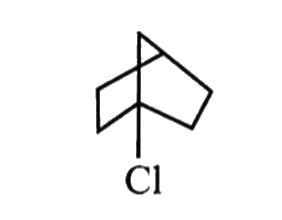
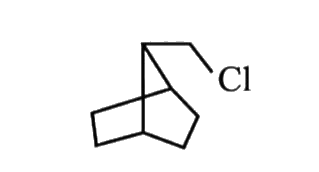
The correct Answer is:C
To determine which statement is not true for an S1N reaction, we need to analyze the characteristics and requirements of S1N reactions.
1. Understanding S1N Reaction:
- S1N stands for unimolecular nucleophilic substitution. The term "unimolecular" indicates that the rate-determining step involves only one molecule, which is the substrate undergoing substitution.
2. Mechanism of S1N:
- The S1N reaction occurs in two steps:
- Step 1: Formation of a carbocation intermediate after the leaving group departs (e.g., Cl⁻).
- Step 2: Nucleophilic attack on the carbocation by a nucleophile.
3. Carbocation Stability:
- The stability of the carbocation formed is crucial for the S1N reaction to proceed. The order of stability is:
- Tertiary carbocation > Secondary carbocation > Primary carbocation > Methyl carbocation.
- Therefore, substrates that can form stable carbocations are more likely to undergo S1N reactions.
4. Analyzing Given Compounds:
- Ethyl Chloride (CH₃CH₂Cl): Forms a primary carbocation, which is less stable. Thus, it is not favorable for S1N.
- Isopropyl Chloride (CH₃CHClCH₃): Forms a secondary carbocation, which is stable and can undergo S1N.
- Bridged Compound: The carbocation formed at the bridgehead position is unstable and will not form, making this compound unreactive for S1N.
- Another Compound with Cl: If it forms a primary carbocation that is stable, it can undergo S1N.
5. Conclusion:
- The statement that is not true for S1N reactions is related to the compound that cannot form a stable carbocation. In this case, the bridged compound is the one that will not undergo S1N due to the instability of the carbocation formed.
Final Answer:
The option that states the bridged compound will undergo S1N reaction is not true.
- S1N stands for unimolecular nucleophilic substitution. The term "unimolecular" indicates that the rate-determining step involves only one molecule, which is the substrate undergoing substitution.
- The S1N reaction occurs in two steps:
- Step 1: Formation of a carbocation intermediate after the leaving group departs (e.g., Cl⁻).
- Step 2: Nucleophilic attack on the carbocation by a nucleophile.
- The stability of the carbocation formed is crucial for the S1N reaction to proceed. The order of stability is:
- Tertiary carbocation > Secondary carbocation > Primary carbocation > Methyl carbocation.
- Therefore, substrates that can form stable carbocations are more likely to undergo S1N reactions.
- Ethyl Chloride (CH₃CH₂Cl): Forms a primary carbocation, which is less stable. Thus, it is not favorable for S1N.
- Isopropyl Chloride (CH₃CHClCH₃): Forms a secondary carbocation, which is stable and can undergo S1N.
- Bridged Compound: The carbocation formed at the bridgehead position is unstable and will not form, making this compound unreactive for S1N.
- Another Compound with Cl: If it forms a primary carbocation that is stable, it can undergo S1N.
- The statement that is not true for S1N reactions is related to the compound that cannot form a stable carbocation. In this case, the bridged compound is the one that will not undergo S1N due to the instability of the carbocation formed.
The option that states the bridged compound will undergo S1N reaction is not true.
Similar Questions
Knowledge Check
Which of the following is most reactive towardSN2 reaction ?
A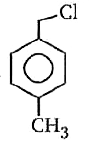 B
B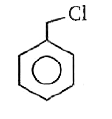 C
C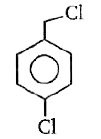 D
D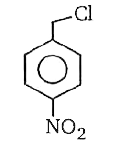
Which of the following is most reactive towardSN2 reaction ?
ACH2=CH−CH2−ClBPh−CH2−ClC DPh−C∣∣O−CH2−Cl
DPh−C∣∣O−CH2−ClWhich of the following statement regarding SN1 reaction shown by alkyl halide is incorrect?
AThe added nucleophile plays no kinetic role in SN1 reaction.BThe SN1 reaction involves the inversion of configuration of the optically active substrate.CThe SN1 reaction on the chiral starting material ends up with racemisation of the product.DThe more stable the carbocation intermediate the faster the SN1 reaction.
Which of the following solvent is suitable for SN1 reaction ?
View SolutionWhich of the following is an SN2 reaction:-
View SolutionWhich of the following is always true for a reaction
View SolutionWhich of the following reactions take place by SN2 reaction?
View SolutionWhich of the following compounds will not give SN2 reaction?
View Solution
